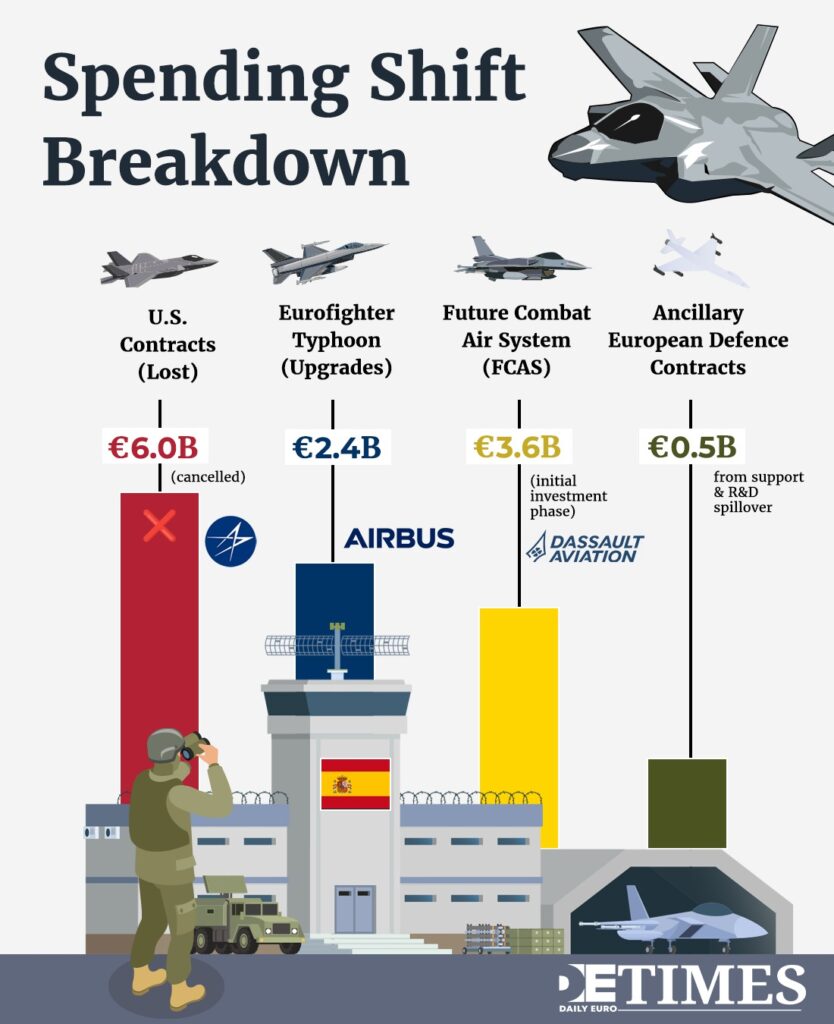Spain’s decision to walk away from the F-35 deal shows how America’s demands for higher military spending is pushing Europe to stand on their own feet. The Spanish government cancelled over €6 billion worth of American fighter jet purchases.
Instead, Madrid will put money into European planes like the Eurofighter and a new joint project called the Future Combat Air System.
America Pushes Too Hard and Loses Out
President Trump wants NATO countries to spend 5% of their national income on defence.
However, Europeans aren't buying more American weapons like Washington expected. Spain isn't alone in this shift. Portugal also turned down F-35 jets because of worries about American policies.
The White House thought higher defence budgets would mean bigger orders for American companies. Things worked out differently. European governments now prefer to spend their money on European companies instead of American ones.
Where the Money Goes Matters More Than How Much
Spain’s defence budget will hit tough new levels under NATO’s targets. Spending 5% of everything the country makes would put real pressure on public spending. The big question isn’t whether to spend more, but where to spend it.
Spain’s top naval officer Admiral General Teodoro López Calderón admitted that Europe doesn’t have stealth fighters ready right now. Even so, Spanish leaders chose to back European projects over quick American fixes.
Such a decision builds up European know-how, while accepting some short-term gaps in military gear. Otherwise governments in southern Europe are choosing strategic autonomy even if it comes with shortfalls in the near term.

Building European Strength Instead of Depending on America
Madrid’s choice puts real money behind European teamwork on defence. The Future Combat Air System brings France, Germany, and Spain together to build next-generation fighter jets. These countries are working together to create cutting-edge military technology.
American pressure to spend more is actually helping European competitors. Spain’s billions will now go to upgrading Typhoon jets and researching new FCAS technology. Neither project helps American companies or American workers.
European defence firms are winning big from this change. Companies like BAE Systems, Airbus Defence, and Dassault get contracts that would have gone to America’s Lockheed Martin. The benefits spread from Spanish factories in Seville to French plants in Toulouse.
America Gets It Wrong About European Choices
Trump’s team thought Europeans would buy American weapons with their bigger defence budgets. The thinking seemed simple: more spending means more sales for American companies. Real life proves more complicated.
European leaders remember how America controls what they can and cannot do with American-made weapons. They've seen the strings attached and the restrictions on sharing technology. Spain watched Germany struggle with American equipment rules. These experiences shaped how Madrid thinks about buying military gear.
Some people might say American systems work better because they’ve been tested in real conflicts while European projects are still being developed. They’d point out that F-35s are flying missions while the FCAS exists mainly on drawing boards.
Yet Spain’s choice shows they’re thinking about the long game, not just what works today.
Working Together as Equals, Not Following Orders
The bigger picture shows European countries treating American demands as suggestions, not commands. Spain’s decision shows they want to stay independent while remaining good NATO partners. Madrid still supports the alliance but chooses European partnerships for building weapons.
This approach helps European technology and industry grow stronger. Spanish workers will build FCAS parts instead of putting together American components. The knowledge stays in European hands. Future improvements won’t need approval from Washington.
European defence cooperation speeds up when American pressure gives countries common ground. Spain, France, and Germany now have stronger reasons to work together on military projects. Their partnership keeps American oversight out while staying compatible with NATO standards.
American officials who demanded higher European defence spending got the numbers they wanted. But they also got an unintended result that strengthens European independence at America’s expense. Madrid’s move away from F-35s toward FCAS development shows how this trend plays out in practice.
European capitals now talk to each other more before making big weapon purchases. Spanish officials checked with French and German partners before walking away from the F-35 deal. This teamwork builds momentum for joint European defence projects across many different types of military equipment.
Keep up with Daily Euro Times for more updates!
Read also:
Freeriders: Spain and Italy Opt Out of NATO Hike
NATO: Security Cooperation Requires Economic Stability
Foreigners Under Fire by Spanish Tax Hikes






